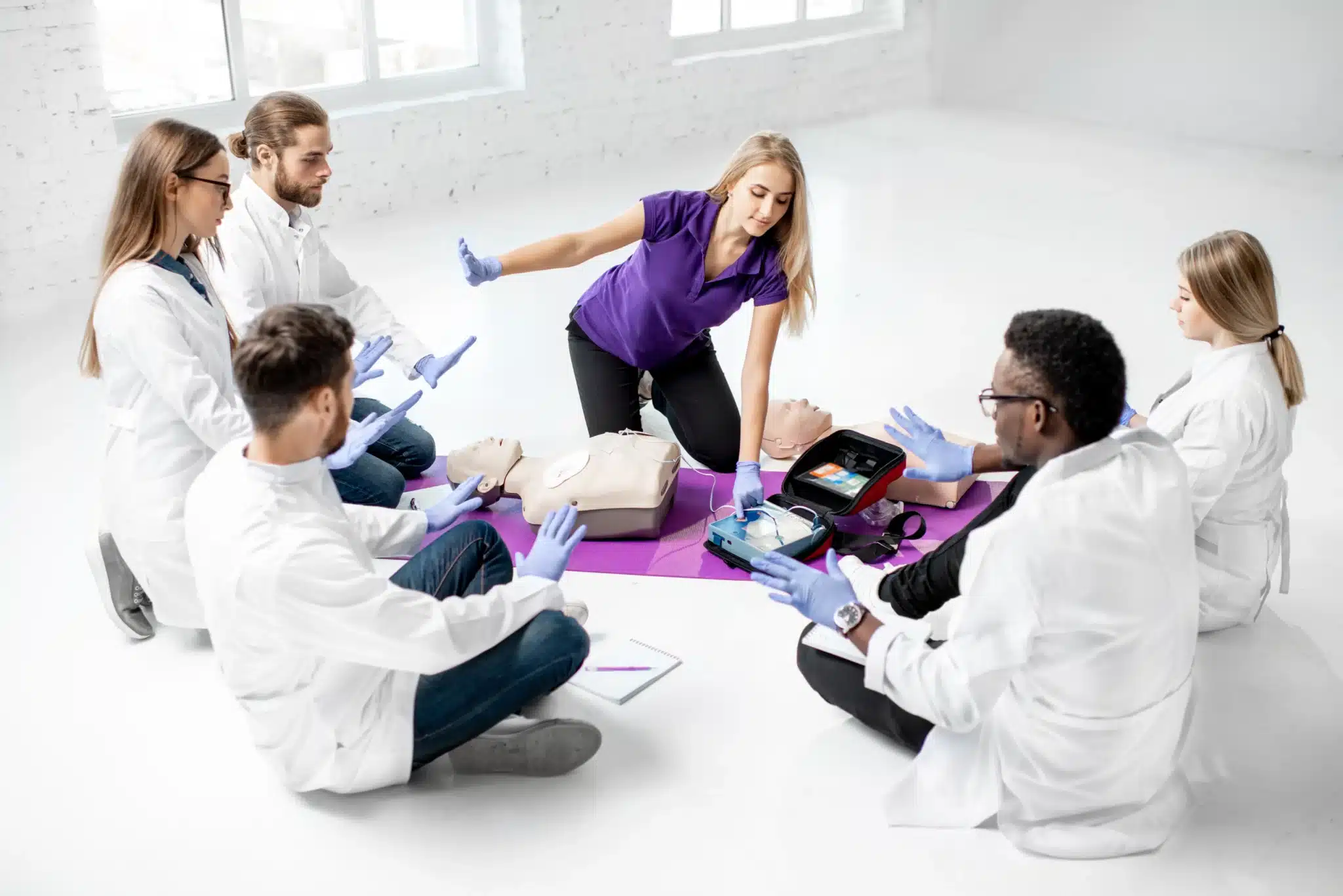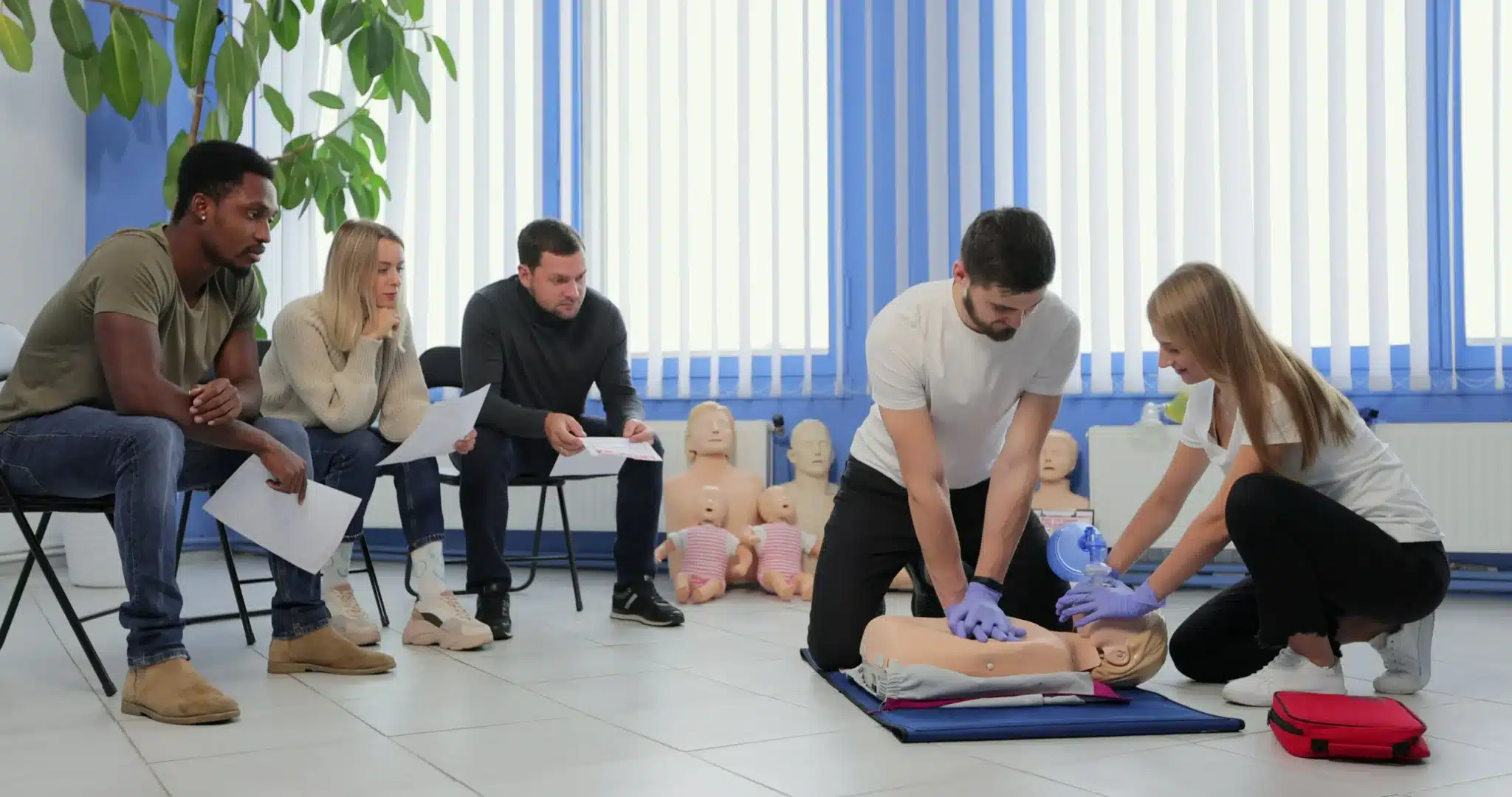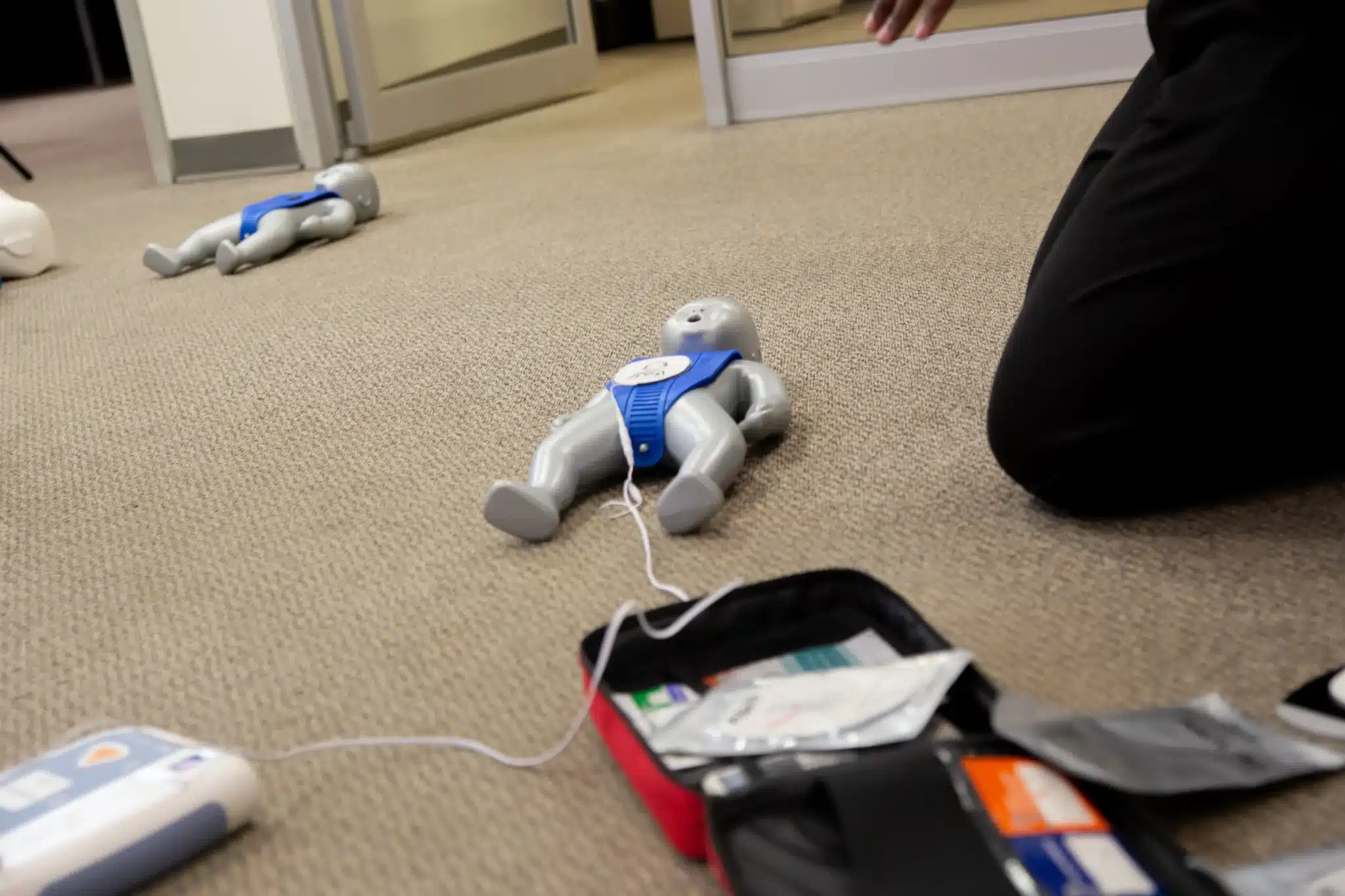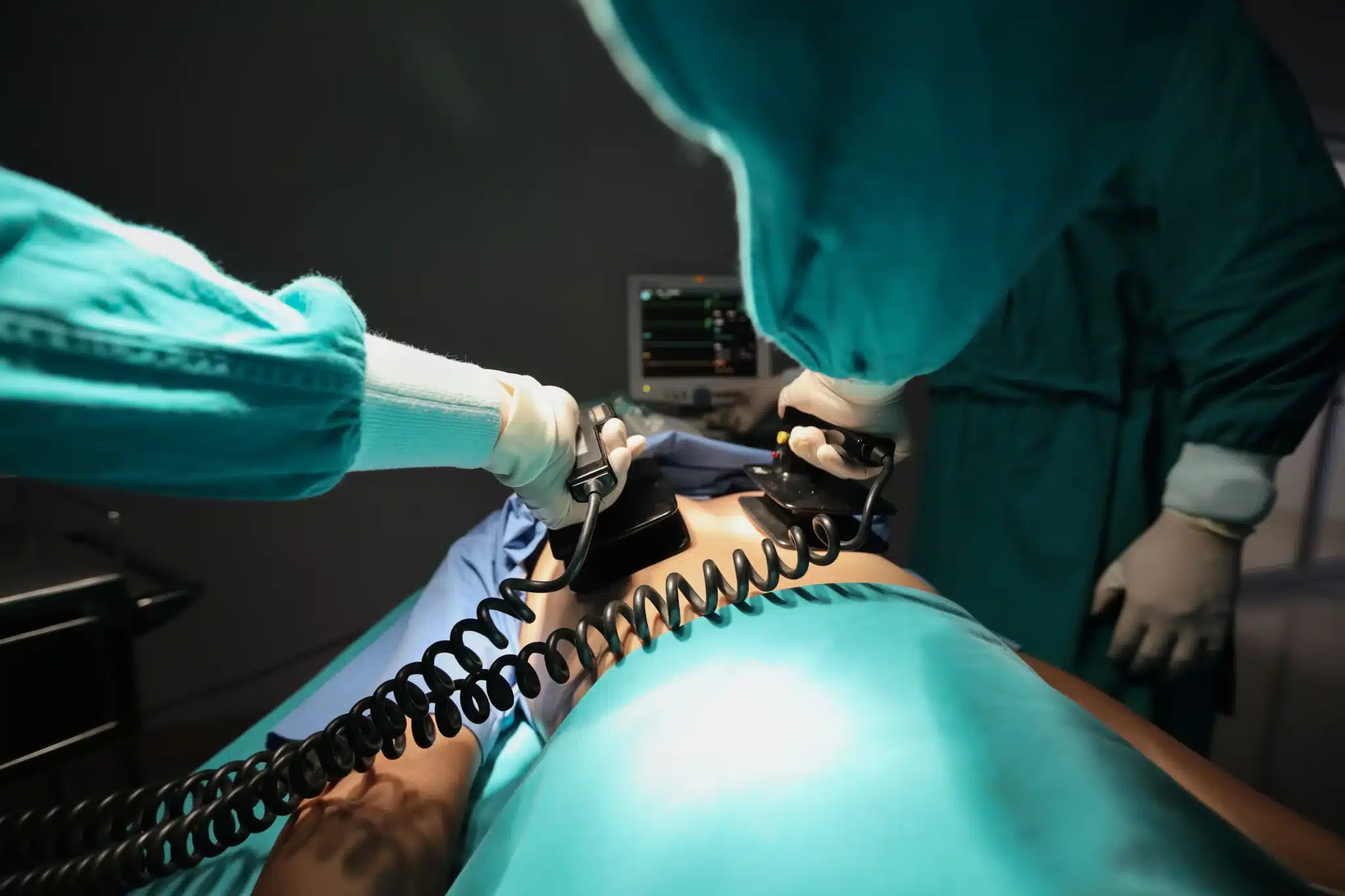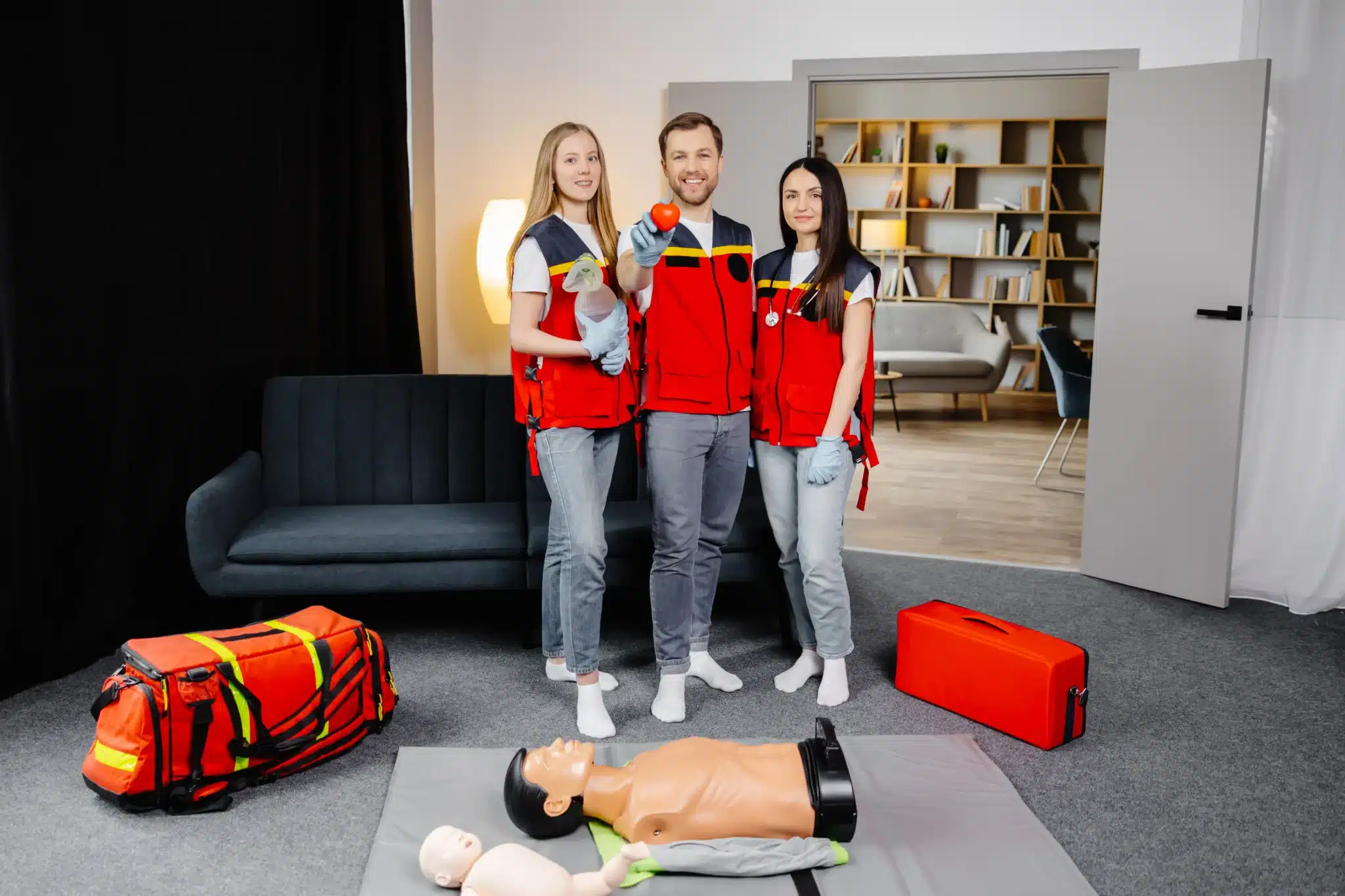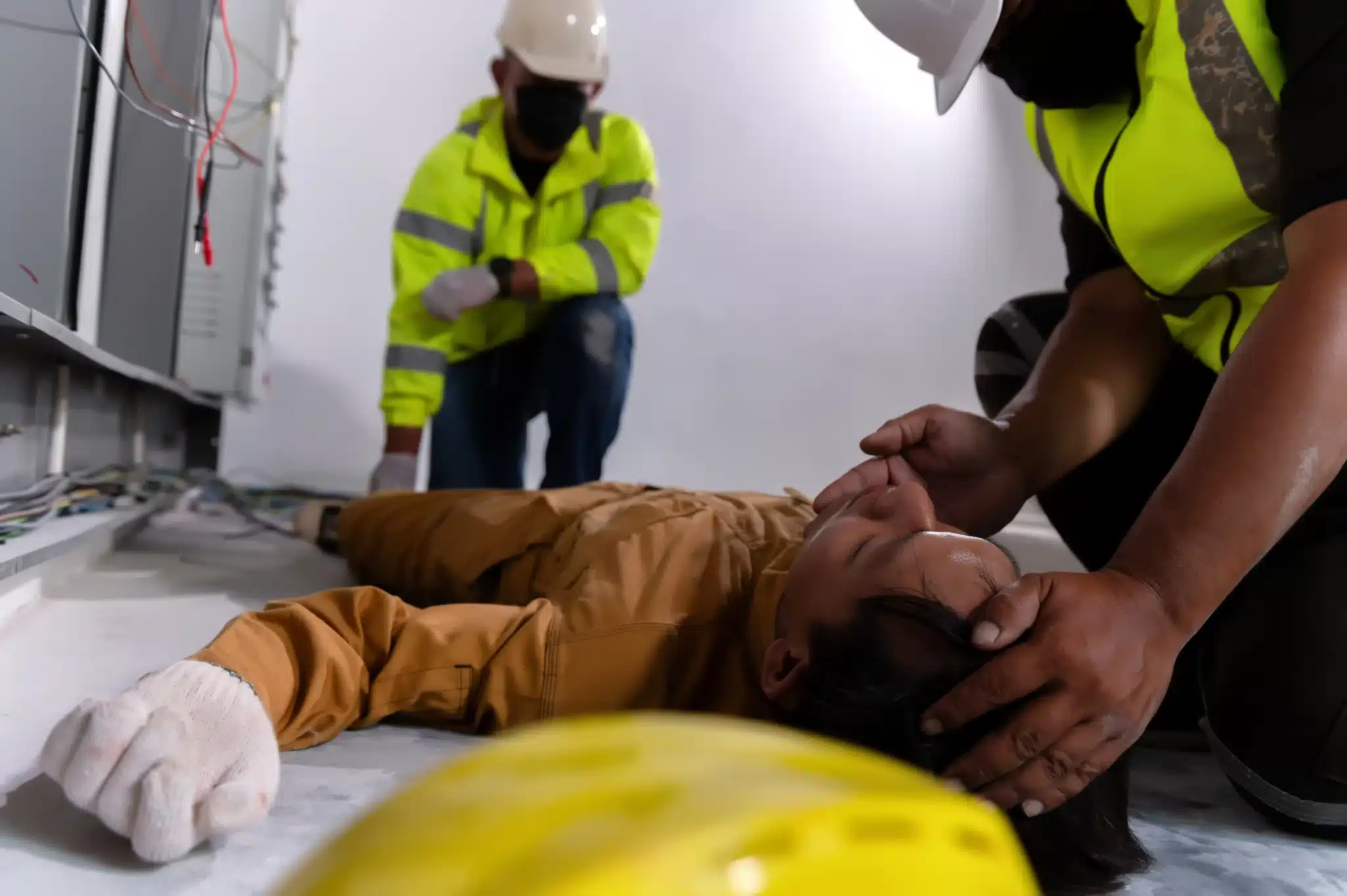Life-saving skills are more valuable than ever. Whether you’re a healthcare provider, a teacher, or simply someone who wants to be prepared for emergencies, knowing CPR and First Aid can make a profound difference. This guide focuses on the American Heart Association (AHA) courses offered in San Jose, providing a clear roadmap for choosing the right certification. We’ll explore the differences between BLS, ACLS, PALS, and First Aid, helping you understand which course aligns with your career goals and personal needs. We’ll also discuss how to find classes, compare costs, and understand the benefits of AHA certification. Let’s empower you with the knowledge and resources to find the perfect life-saving skills training with the American Heart Association in San Jose.
Key Takeaways
- Choose the Right Course: Whether you’re a healthcare provider or want to be prepared for emergencies, consider your career goals and desired skill level when choosing between BLS, ACLS, PALS, and Heartsaver courses.
- Training Fits Your Schedule: CPR and First Aid training in San Jose offers flexible options, from in-person classes to blended learning, making it easy to find a course that works for you.
- AHA Certification Benefits: AHA certifications are globally recognized and can enhance your career, boost your confidence in emergencies, and empower you to save lives.
Which CPR & First Aid Courses Does the AHA Offer in San Jose?
Knowing which CPR and First Aid course is right for you can feel overwhelming. This guide will break down the American Heart Association (AHA) courses offered in San Jose to help you choose the best fit.
BLS
The BLS course provides healthcare providers and emergency responders with the skills to perform high-quality CPR for adults, children, and infants. It also covers AED use and other critical life support techniques. This BLS course is a foundation for many healthcare careers.
ACLS
The ACLS course is designed for healthcare professionals who manage cardiopulmonary arrest and other cardiovascular emergencies. This advanced training builds upon BLS skills, covering topics like airway management, effective team dynamics, and treating strokes. ACLS courses in San Jose offer comprehensive training and certification.
PALS
PALS focuses on the specialized needs of infants and children during medical emergencies. This course equips healthcare providers in pediatric settings with the skills to respond effectively to respiratory and cardiac events in young patients. PALS certification is essential for anyone working with children in a medical capacity. For those in the San Jose area, it’s easy to find information on AHA courses including PALS.
Heartsaver First Aid CPR AED
The Heartsaver First Aid CPR AED course is perfect for those with little to no medical background who need certification for their job or other requirements. This course covers essential life-saving skills, including CPR, basic first aid, and how to use an AED. It’s a valuable resource for anyone wanting to be prepared for emergencies. If you’re in San Jose, you can find CPR courses that fit your schedule.
Bilingual Classes
Many training centers in San Jose offer CPR and first aid classes in multiple languages, such as Spanish and Vietnamese. These bilingual classes make these vital skills accessible to a wider community, ensuring everyone has the opportunity to learn life-saving techniques.
How to Enroll in AHA Courses in San Jose
Ready to gain life-saving skills? Enrolling in an American Heart Association (AHA) course in San Jose is straightforward. We’ve broken down the process to help you get started.
In-Person Classes
Prefer hands-on, face-to-face instruction? In-person classes provide a structured learning environment with direct interaction with instructors and other students. These classes are available throughout San Jose and the surrounding Bay Area, including locations like Milpitas and Hayward. For larger groups or specialized needs, on-site training can often be arranged. Check with your chosen training center for availability.
Blended Learning
Juggling a busy schedule? Blended learning combines online self-paced study with the practical application of in-person skills sessions. This flexible approach lets you learn the course material at your own speed before demonstrating your skills in a hands-on session. These courses meet OSHA requirements, making them a convenient option for many professionals. Fremont CPR Classes offers this blended learning format for several courses, including BLS.
Flexible Scheduling
Finding a class that fits your schedule is easy. Courses are offered daily in San Jose and over 60 other cities, with various times and dates available. This flexible scheduling, combined with blended learning options, makes it easier than ever to fit life-saving training into your life. For those looking for discounted options, explore group discounts available through Fremont CPR Classes.
Register Online
Ready to sign up? Most training centers offer online registration. Visit the Fremont CPR Classes website to view course schedules, compare pricing, and register for the class that best suits your needs. You can also find a comprehensive Northern CA CPR directory on their site for more options. If you have questions or prefer a more personal touch, reach out through their contact page.
Skills Check Sessions
For healthcare providers needing to renew their certification quickly, skills check sessions are a great option. These focused sessions allow you to demonstrate your existing skills and update your certification without retaking the entire course. Contact Fremont CPR Classes to learn more about skills check availability and scheduling. You can reach them through their contact form.
Course Costs & Discounts
Knowing the cost of CPR and first aid training is an important part of planning your certification. This section covers typical costs, discounts, and payment options for American Heart Association (AHA) courses in San Jose.
Course Pricing
Course fees vary depending on the provider and the specific course. For example, an ACLS Initial course, including online learning, skills testing, and your certification card, typically costs around $290. This price reflects the comprehensive nature of AHA training. Contact Fremont CPR Classes for current pricing on all courses. We also offer a convenient Northern California CPR directory to help you compare options.
Group & Student Discounts
Many CPR training providers offer discounts for groups and students. Group discounts make training more affordable for teams or groups of friends. Student discounts help make these essential, life-saving skills accessible to those still in school. These discounts can significantly reduce the overall cost of certification. Check with your chosen provider for specific eligibility requirements and discount amounts.
Low-Price Guarantee
Some training centers in the area offer a low-price guarantee, promising the most competitive rates for courses like CPR and ACLS. This gives you peace of mind knowing you’re receiving high-quality training at a fair price. Be sure to compare pricing and guarantees when choosing a provider. Fremont CPR Classes is committed to offering competitive pricing for all our courses. We encourage you to explore our BLS course options as well.
Payment Options
Most providers offer various payment options to simplify the registration process. These options often include credit cards, debit cards, and sometimes even financing plans. Contact your chosen training center directly to learn about their specific payment options.
Early-Bird Discounts
While not always available, some providers may offer early-bird discounts for those who register in advance. It’s always wise to ask about potential early registration discounts when signing up. Check with Fremont CPR Classes to see if any special promotions are currently running.
Instructor Qualifications & Training
Want to teach American Heart Association (AHA) courses? It’s a rewarding path, and understanding the qualifications can help you get started. Here’s what you should know about becoming an AHA Instructor:
AHA Certification
First, you’ll need a current provider certification for the course you want to teach. So, if you plan to teach BLS, you’ll need to be BLS certified. This ensures instructors possess a solid understanding of the material. The American Heart Association website offers more information on becoming an AHA Instructor.
Ongoing Education
The AHA provides instructors with continuing access to the latest emergency cardiovascular care science, course updates, and training resources through their online platform. This keeps instructors informed on the best practices and techniques, ensuring they have the most current information.
Experience
The AHA offers instructor certification paths for people with diverse experience levels. Whether you have a medical background or are passionate about teaching life-saving skills within your community, there’s a path for you. This makes becoming an instructor accessible to a broader range of people. Heart Start CPR offers additional information on becoming an AHA instructor.
Hands-On Training
Instructor courses equip candidates with the knowledge and skills to teach effectively. These courses offer hands-on training and easy-to-learn modules. This practical approach prepares instructors to deliver high-quality training. You can find AHA Instructor courses in San Francisco, Oakland, and San Jose.
Benefits of AHA Certification
Choosing the right CPR certification is an important decision. Earning your certification through the American Heart Association (AHA) offers distinct advantages that can significantly impact both your personal and professional life. Let’s explore some key benefits:
Global Recognition
AHA certifications are recognized worldwide, making them a valuable asset wherever you go. This global recognition provides flexibility and opens doors to a wider range of experiences. For those seeking certifications in the San Jose area, training centers like San Jose CPR Certification offer a variety of AHA-approved courses. This ensures your certification will be understood and respected, whether you’re traveling or pursuing career opportunities internationally.
Career Advancement
In many healthcare professions, holding an AHA certification is often a requirement for employment or advancement. It demonstrates a commitment to maintaining high standards of patient care and safety. Courses like BLS can enhance your resume and showcase valuable skills to potential employers, even outside of healthcare. This is particularly relevant in fields like education, childcare, and fitness. AHA certifications can give you a competitive edge in the job market.
Emergency Preparedness
AHA courses equip you with the knowledge and skills to respond effectively in medical emergencies. From CPR and first aid to advanced life support techniques, these courses empower you to act confidently and potentially save lives. Knowing how to respond in critical situations provides peace of mind and can make a real difference. For options on group discounts, check out group CPR discounts to make training more accessible.
Life-Saving Confidence
Beyond the technical skills, AHA certification instills a sense of confidence and preparedness. This confidence extends beyond professional settings, empowering you to handle emergencies in your personal life, too. Whether assisting a family member or a stranger, your training will allow you to react calmly and effectively under pressure. If you’re in Northern California and looking for CPR resources, check out this helpful CPR directory.
Worldwide Validity
AHA certifications are often preferred by healthcare employers due to their comprehensive and rigorous training standards. This recognition ensures that certified individuals possess the in-depth knowledge and practical skills necessary to provide high-quality care. The validity of AHA certifications, often compared to other providers like the Red Cross, highlights the organization’s commitment to excellence in emergency medical training. You can learn more and find a course that’s right for you by contacting Fremont CPR Classes.
Where to Find AHA Courses in San Jose
Finding the right CPR class can feel overwhelming, but several excellent resources in San Jose make it easy. Whether you’re looking for basic life support skills or advanced cardiac care training, this list of providers and locations will point you in the right direction.
Fremont CPR Classes
Fremont CPR Classes offers a comprehensive range of American Heart Association (AHA) courses, including BLS, ACLS, PALS, and First Aid. They focus on high-quality instruction, convenient scheduling, and competitive pricing. Serving Fremont, Newark, and San Jose, they offer various course formats to fit your schedule and learning style. For healthcare providers, check out their BLS course. They also offer an ACLS course for advanced cardiac life support training. Discounts are available for group classes.
San Jose CPR Certification
San Jose CPR Certification provides AHA-certified courses in CPR, BLS, ACLS, PALS, and First Aid. They emphasize convenient scheduling and offer a low-price guarantee, making their courses accessible and affordable. Their central location makes them a convenient option for those living or working in San Jose. Explore their website or contact them for more information.
CPR Training Center
With classes offered daily in San Jose and over 60 other cities, CPR Training Center provides flexible scheduling and blended learning options. Their blended learning format combines online coursework with in-person skills sessions. This allows you to learn at your own pace and practice essential skills with certified instructors.
Community Centers & Healthcare Facilities
Many community centers and healthcare facilities in San Jose also offer AHA-certified CPR and First Aid courses. These locations often provide courses tailored to community members and healthcare professionals. Check with your local community center or nearby hospitals and clinics for course offerings and schedules. You can also explore online directories, such as the Northern CA CPR Directory, for a comprehensive list of training centers.
Choose the Right AHA Course
Deciding which American Heart Association (AHA) course is right for you depends on a few things: your career goals, existing skills, and experience level. Here’s a guide to help you find the perfect fit.
Career Requirements
Some careers require specific AHA certifications. For example, most healthcare providers need BLS certification. If you’re pursuing a career in healthcare, check with your licensing board or employer to see which certifications you need. AHA training programs maintain high standards, so you can be confident you’re receiving excellent instruction in life-saving techniques.
Compare Course Options
The AHA offers a range of courses designed for different skill levels and needs. ACLS is for advanced healthcare professionals, while PALS focuses on pediatric emergencies. Heartsaver courses, including CPR and First Aid, are a good fit for anyone who wants to learn essential life-saving skills. Understanding the differences between these courses helps you make the right choice.
Recommendations by Profession
Some certifications are required for certain professions, while others are recommended. Teachers, coaches, and childcare providers often benefit from having a current CPR and First Aid certification. Even if it’s not required, having these skills offers peace of mind and allows you to respond effectively during emergencies. Our Northern CA CPR Directory offers additional resources.
Address Training Concerns
We understand that some people feel nervous about taking a CPR or First Aid course. At Fremont CPR Classes, we emphasize a supportive and engaging learning environment. Our instructors create a comfortable atmosphere where you can ask questions and practice your skills without feeling intimidated. Contact us with any questions—we’re happy to help! We also offer discount group classes to make training more accessible.
Related Articles
- BLS Certification in San Jose: The Complete Guide – Fremont CPR Classes
- Online ACLS Classes in San Jose: Your Guide – Fremont CPR Classes
- HeartCode PALS San Jose: Your Certification Guide – Fremont CPR Classes
- CPR Training in San Jose: Your Complete Guide – Fremont CPR Classes
- CPR Certification in San Jose: A Complete Guide
Frequently Asked Questions
What is the difference between BLS and ACLS? BLS (Basic Life Support) teaches the fundamentals of CPR, AED use, and basic airway management for adults, children, and infants. It’s a prerequisite for many healthcare positions. ACLS (Advanced Cardiovascular Life Support) builds upon BLS, covering more complex situations like cardiac arrest, stroke, and acute coronary syndromes. It’s designed for healthcare professionals who lead or participate in resuscitation teams.
How do I choose the right CPR course for my needs? Consider your job requirements and personal goals. If you work in healthcare, check with your employer or licensing board for required certifications. If you want to be prepared for emergencies at home or in your community, a Heartsaver CPR/AED or First Aid course might be a good fit. If you’re unsure, reach out to a training center like Fremont CPR Classes for personalized guidance.
What does “blended learning” mean? Blended learning combines online coursework with in-person skills practice. You’ll study the course material at your own pace online, then attend a shorter in-person session to demonstrate your skills and receive your certification. It’s a flexible option for busy schedules.
Are AHA certifications valid internationally? Yes, AHA certifications are widely recognized and respected globally. This makes them a valuable asset if you travel or plan to work in healthcare abroad.
How much do CPR and First Aid courses cost? Course fees vary depending on the provider, location, and specific course. Many providers offer discounts for groups, students, or early registration. Contact Fremont CPR Classes or check their website for current pricing and discount options.
